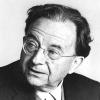To Have Or to Be
Erich Fromm on two different ways of living one’s life
Erich Fromm distinguishes between two modes of existence. One can live one’s life in the “mode of having” or in the “mode of being”. The mode of having sees everything as a possession, while in the mode of being we perceive ourselves as the carriers of properties and abilities, rather than the consumers of things.
This article is part of The Ultimate Guide to the Philosophy of Erich Fromm.
If you like reading about philosophy, here's a free, weekly newsletter with articles just like this one: Send it to me!
Welcome back to another post in our year-long exploration of how we can live the classic philosophies of happiness in our own lives! Last time, we talked about how we can become a bit less dependent on technology in our lives and how we can try to find meaning in everyday practices like cooking a meal or washing the dishes. It is an idea that we will meet again when we talk about the lives of hermits later this summer.
The modes of having and being
Erich Fromm thinks that we can capture a fundamental difference between two entirely different ways of living one’s life in the distinction between “having” and “being.”
In a naive, grammatical view, one might think that “having” would apply to possessions (“I have a car”), while “being” would be used to describe properties of a person (“I am a singer”). But things are not so clear-cut. How about “I have a cold”? We can express the same as “I am sick,” or “I feel ill.” Do these three really express precisely the same idea — or is there a subtle but important difference between these three that we usually tend to miss?

And then: in what sense do I “have” a family? Do I “have” an education? I did “receive” one, so perhaps I should “have” it now, but does it really make sense to possess education? Isn’t it more like a skill? We also speak of “having” skills. But if you think about it, isn’t it more sensible to say that we “are” skilful in a particular way? A skill seems to be more like a property (“she can play the piano”) rather than a possession (“she has a piano-playing ability”). The opposite can also happen. “I am a house-owner,” although commonly said, seems mistaken. Being a house-owner is not a property that affects my person or that emanates from it. It is an external thing, a pure possession, so “I have a house,” seems more appropriate.

Erich Fromm (1900-1980)
Erich Fromm (1900-1980) was a German social psychologist and philosopher who had enormous popular success from the 1950s all the way to the end of his life in 1980. We discuss his work and his relation to Marxism and Freud.
In a more general sense, it seems that “having” things emphasises a duality between the owner and the thing — a worldview in which I am standing at the centre of a circle of stuff that is arranged all around me: my possessions. They are distinct from me and related to me only in the sense that I have a formal right of ownership over them. I can obtain things or give them away and throughout these processes “I” myself don’t change at all. Possession is oriented entirely towards the outside world and doesn’t touch me in who or what I am.
“Being,” on the other hand, is about those qualities that merge with my own existence: skills that are mine, that I can exercise and that cannot be taken away from me.
I can neither buy nor sell a skill.
I can pay to be taught the skill, but that’s another thing. I still have to do the learning and practising myself and money cannot buy that. And it’s not only skills. Qualities like being thoughtful, honest or funny are not possessions that one can “have” in any meaningful sense. The same is true of all the Aristotelian virtues and of phronesis, the ability to know how to live a good life. One can lose all of one’s possessions in a big fire, but no fire can burn away one’s cultivation, one’s humour or one’s courage. Some diseases like dementia might do that, but then, these are altering the whole fabric of who the person is. In many senses, a person with advanced dementia is indeed an entirely different person.
Now, what Fromm wants to do is to convince us that the whole of our lives can be lived in either a “mode of having” or a “mode of being.” Education, for example, can be “had” in the form of a certificate. But if we don’t make it part of ourselves (by “being” educated), then the certificate will have little value. If it gets lost, then I lose what I had; but if I “am” educated (in the mode of “being”) then the certificate is not so important any more. It’s merely an outward sign of something that can’t be lost because it’s a part of me.
One flower, two worlds
To illustrate the difference between the two modes of existence, Fromm quotes two poems. Each is about a flower. One is English, Western, and written in the mode of having. One is Japanese, Eastern, and written in the mode of being. It’s interesting to see them side by side:
English poet Alfred Lord Tennyson (1850–1892):
I pluck you out of the crannies,
I hold you here, root and all, in my hand,
Little flower — but if I could understand
What you are, root and all, and all in all,
I should know what God and man is.
Japanese poet Matsuo Bashō (1644-1694):
I see the nazuna blooming
By the hedge!
Read the two poems carefully and you will see what Fromm makes out to be the fundamental difference between two entire worlds — one rooted in the notions of having, one existing in the mode of being.
”The difference is … between a society centred around persons and one centred around things,” he writes. While Tennyson wants to possess the flower, plucking it out of the place it lived and killing it in the process, the Japanese poet is merely “looking carefully” at the flower — as if even the looking itself might harm it.

Erich Fromm on the Psychology of Capitalism
Erich Fromm points out that capitalism, in order to work, requires a large population of identical consumers with identical taste.
Tennyson destroys the flower in the name of science and understanding, and his attitude is, indeed, characteristic for the way our natural sciences approach their subjects. Things have to be isolated, cut into slices, put under the microscope. Life has to be dissolved in acids, sequenced, cloned, vivisected, tormented — all in the name of understanding, just like in that poem. But neither the scientist nor the poet realise that after their object of study has been killed and dismembered, there is little left to “learn” about it. One can enumerate and catalogue the pieces, yes, but that’s all. What made the flower live, what caused its beauty, what made us notice it and be enchanted by it, which are the most interesting questions about it — these we won’t answer by taking it apart, uprooting it, killing it.
Having and being as states of mind
Fromm also looks at our everyday language and our use of verbs and nouns — and finds there symptoms of our “having”-heavy lifestyles too. In recent times, he says, nouns are used more often than verbs:
But this is not only a random choice of words. When we speak like this, we create a different relationship to things. “I have a problem” replaces the subjective experience of being troubled. “The ‘I’ of experience is replaced with the ‘it’ of possession,” says Fromm. But nobody can actually have a problem. Problems are not things that we can possess. What happens instead is that people who speak like this have transformed themselves into the problem and are now “owned by [their] creation.”
Let us then, this week, try to watch the way we speak. Do we usually express ourselves in the mode of having or in the mode of being? When do we slip into the mode of having and why? Is it when we talk about our families? Our possessions? Our plans? Our future?
And what will happen if we consciously try to avoid these speech patterns? What if we replace every “I have” with an “I am”? Will we perhaps feel more alive, more connected to ourselves, more active, less alienated from our own feelings and from the world around us?
Time to find out.
Return to The Ultimate Guide to the Philosophy of Erich Fromm.
◊ ◊ ◊
Thanks for reading and have a great week! If you’d like to buy Fromm’s book and read it for yourself, you can get it here:
Fromm’s book goes into a lot more detail than I could present here. There’s no replacement for reading Fromm himself, as millions of readers have known over the past six decades.
Amazon affiliate link. If you buy through this link, Daily Philosophy will get a small commission at no cost to you. Thanks!






